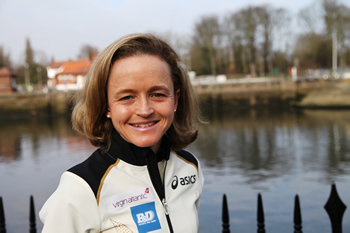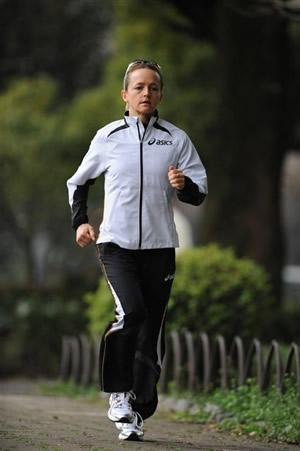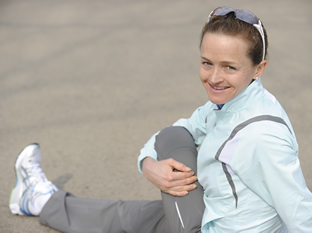For this month's Olympics feature, we spoke to British athlete Mara Yamauchi. Mara currently holds the second fastest time by a British woman over the marathon, and recently qualified for the London 2012 Olympics. Mara was born in Oxford but spent her formative years in Nairobi, Kenya where her parents lived. She didn't take up running seriously until she was an undergraduate at University and earned her first GB vest only after finishing her studies. Mara joined the Foreign and Commonwealth Office in 1996 and worked at the British Embassy in Tokyo from 1998 to 2002. It was there she met her husband Shigetoshi Yamauchi who is now also her manager, coach and training partner.
|
Can you tell us about your running background? Have you always enjoyed long-distance running?
I have quite an unusual background as an athlete because most elite athletes are quite younger than me. I'm a bit of an old lady in this game! I enjoyed many different sports when I was at school. I did swimming, tennis, netball, field hockey so I was very active but didn¡Çt specialize particularly on running until I was about 18. I joined my University's running club and improved after I started training properly. After I left full time education, I wanted to be an elite athlete and go to the Olympics but I wasn't at the level where I could earn a living as an athlete, and my parents were pushing me to get a 'proper job'. There wasn't really a system to support full time athletes and I felt that getting a job would be more secure. |
 Mara Yamauchi
Mara Yamauchi
|
I applied to the civil service and chose the foreign office because I lived in Africa till I was 8 and travelled a lot and wanted to work overseas. While I was working at the foreign office I kept my dream of being an elite athlete alive, and when I had a chance to reduce my working hours which was when I was 29, that's when I started to go back to running seriously.
Through your work with the Foreign and Commonwealth Office (FCO) you went to work at the British Embassy in Tokyo in 1998. Was this your first time to go to Japan and what was your initial experience of living and working there?
My posting to Japan with the FCO was actually my second time in Japan. When I was a Masters student at LSE I saw an advert for a study tour programme run by the Japanese foreign ministry. I had to write an essay about something Japan-UK related, and won one of the places on this tour! During the trip we had lectures from economists and University professors, we did a home-stay, and visited historical and cultural sites in Tokyo, Kyoto and Hiroshima. That really opened my eyes - I thought it was fascinating. The impression I got from Japan was that the people were very shikkari - they were very hard working and serious and did things properly. I thought that it was a country I'd like to live in and work in so in the Foreign Office when I had to bid for an overseas posting I asked for Japan. The posting required me to learn Japanese which I did on the Foreign Office's training programme.
I had a lot of culture shock during my first few months of really living in Japan. Daily life was hard - I would go to the supermarket and buy something and when I got home and it was something completely different! I had difficulty understanding the language but Japanese people are incredibly kind and patient. Working at the British Embassy was great. The compound occupies a wonderful location in the centre of Tokyo, next to the Imperial Palace, so I could do my jogging around the moat! The work was also very interesting. The main part of my job was following Japanese politics. Although many Japanese politicians did speak English we would communicate mainly in Japanese - it was great really that I was forced to speak Japanese!
|
 Mara holds the second fastest marathon time by a British woman
Mara holds the second fastest marathon time by a British woman
|
Did you compete in any races during your time in Japan?
Yes I did. In my first year studying I lived in Kamakura and I joined a local team there and ran a few races with them. I also went to Sapporo in October one year and ran a 10K. I just remember the autumn leaves being beautiful and the fresh air...
Later when I was living in Japan as an athlete I visited many of the regional towns for races. For example, I did the Marugame half-marathon in February - that's a famous event in Kagawa. I also visited Hagi in Yamaguchi prefecture where I ran as a guest in a race. It was stunningly beautiful because it was the season for natsumikan (summer tangerine) and there were all these old samurai houses with the natsumikan just coming over the roofs. You could think you were there 200 years ago.
Japan has a lot of really top level races in these small and beautiful regional towns. In the lists of the fastest half marathons that are run every year - races like Marugame will be right up there. The people of the towns are always so proud and welcoming - you can tell they are so happy to have visitors and they want to show off their town.
Would it be easy for people from the UK who are interested in running to go to Japan and take part in these races?
Yes definitely. If you don't speak or read Japanese the entry process could be a bit tricky but there are ways around that! The Tokyo marathon actively encourages foreigners to take part and they have adverts in running magazines in foreign countries.
|
The smaller regional races are always incredibly welcoming and you just have to figure out the entry process. I'm a big fan of entering a race in a foreign country and going there and spending two or three days having a little holiday to soak up the local atmosphere. If somebody was going to visit Japan from the UK and they do running, I would strongly encourage them to do that because it's a great way to meet people and get a feel for the place - do a bit more than the typical tourist things. You can see some Olympic athletes along the way!
What comparisons do you make between running in Japan and other places in the world?
Running in Japan is quite unique I would say, because for a start it's incredibly popular - not only at elite level. You have hundreds if not thousands of elite athletes training full time, a lot of them for the marathon - whereas in the UK there were about three of us on the women's side. It's also popular amongst armchair athletes who like to watch the marathon on TV! However, much of Japan - at least the areas I lived in - are very urban and built up - so there are much less green and open spaces as there are in the UK. But that doesn't get people down! People will find anywhere to run. When I first went there I used to think that running many laps of the same place was boring, but actually as a marathon runner you have to learn mental discipline and I got to quite like doing laps of places like the Imperial palace and the outer section of Meji-shrine.
Another thing from an elite athletes perspective is that the level of Japanese female marathon running is about the best in the world. Ffor me to go there as an athlete and race against people like Mizuki Noguchi - who won the Athens Olympic marathon - was a dream. You need to race against the best in the world to spur you on and see how close you can get to them.
How has your time in Japan affected your aspirations as an athlete?
The main thing it did for me was to realise that I could compete with the best in the world. Soon after we moved back to Japan when I was an athlete, we went altitude training in Sugadaira, Nagano. I went out for a run shortly after arriving and as I was warming-up Mizuki Noguchi ran passed me. I was so over-awed by the fact that the then Olympic champion had been so close that I could have reached out and touched her hand! I was also in awe of Takahashi Naoko who won the Sydney Olympic marathon. I would meet her at races - but she was just an ordinary person - as all athletes are. We're all just ordinary people doing something a bit out of the ordinary. That was important for me because it made me realise that I could be like them. Soon after, I was in a half-marathon race in Sapporo with Noguchi, and of course I didn't think I could beat her, but for half or more of the race I was running next to her! I was running along feeling like a complete imposter - but then eventually I thought - here I am keeping up with the Olympic champion and the Beijing Olympics are only a year away! I believed I could really aim high. In the end she got injured and didn't run in Beijing and I finished 6th, but experiences like that make you realise that things that you think are impossible are actually achievable if you put your mind to it. The same is true in any walk of life. If you dream to be a musician or have your own business or any kind of dream, if you think it's impossible and then you meet people who've done it - it suddenly makes it seem more achievable.
|
In 2002 you married your husband Shigetoshi - a Japanese national. Did you experience any cultural hurdles in joining a Japanese family?
To get the truthful answer you need to ask them that rather than me! I'm incredibly lucky because Shige's family are wonderful - his parents and brother and his family are incredibly welcoming and I've never heard anything about "we don¡Çt want our son marrying a foreigner" or anything like that. They've always been so kind to me. I do make an effort to fit in with Japanese culture - I take my shoes off and always speak Japanese with them and try to go along with Japanese mannerisms because I'm in a Japanese home.
Have they been supportive of your athletic goals?
In general yes I think they take some pride in somebody called Yamauchi competing in the Olympics. If I win a race in Japan they get excited!
|
 Mara won the Ladies marathon in Osaka in 2008.
Mara won the Ladies marathon in Osaka in 2008. |
They've come to watch several of my races in Japan which is nice. I think they worry sometimes that we need to settle down and get proper jobs - which is fair enough! Athletics is a fairly insecure existence. We share their worries - our life would be more secure if we were doing 9 to 5 jobs, but we decided that I have some talent for distance running. It's a rare thing to be able to go to the Olympics and purely by luck the next Olympics are in London so I can't really retire before that!
Shige is my coach and training partner so for most of the running I do he comes on his bike and times me, passes me drinks and coaches me while I¡Çm running. He's my manager too. If I go to a race he negotiates with the race organiser about where we stay, manages the sponsors etc. He also does massage, cooking - it's a full time job for both of us. It's quite hard for him because most people don't understand the need for somebody like that - they think he's just sitting at home - but he's not! The most important thing for an athlete is rest. If you don't rest properly you can't train properly and then you won't improve. For me the ideal situation for an athlete is to be able to train, eat, rest; train, eat, rest; train, eat, rest! I don't want to be up late having to do tax returns or emailing sponsors - so if he's doing that I can rest.
What has been your most memorable race to date?
The Beijing Olympics was very memorable because it was my first Olympics and since I was aged 11 I had a dream to take part and be an elite athlete. I was only really aiming to make the team, but I kept improving and I finished 6th which was well beyond my expectations. But probably more special than that was so far the only marathon that I won - in Osaka in January 2008. It was and especially sweet win because the previous summer I'd run the world championships also in Osaka but I messed up my race tactics and finished 9th. Kayako Fukushi (who is one of Japan's top athletes) went off very fast ahead of the rest of us and it looked like she would win but then we all caught her up towards the end of the race. I was in great shape and it felt easy, and it was just so exciting to be able to win a race having tried on many a previous occasion. The crowd were really welcoming. So that was really special for me.
You have qualified for this year's London Olympics along with Paula Radcliff. What are your personal expectations for the games?
In general terms I think the Olympics will be fantastic. I know people have worries but I think the games will be a great opportunity to showcase London and the UK to Japan and the rest of the world. In terms of my race, after Beijing I was only 22 seconds off the medal so after that I said to myself - I'm going to win a medal in London no matter what! But from 2009 onwards I've had lots of injuries and I haven't been able to train. Now I just want to get to the start of the race in good shape, feeling happy and confident and ready to race and do my best on the day. If that means a medal then that's brilliant but if not then I'll be happy with what I've achieved. The Japanese team has just been picked and as usual its very strong - I think any of those athletes could win medals - top 5 at least.
The women's marathon is moving on all the time. In Kenya several athletes are running under 2:20, which for women is gold standard marathon running. Russia and America are also turning out very fast, but the London Olympic course is not a fast one. It's a challenging course so that will make it even more interesting and often the favourites don't necessarily do well in the Olympics. The course is tough for the athletes but it's brilliant for the spectators because it's a loop course so if you stand in one place you¡Çll see the athletes at least 3 times, maybe 4. If you're willing to dash across the middle of the loop then you'll see them 6 or 8 times! The start is at 11 so if people get there early in the morning I think they'll get a good roadside view somewhere along the course before it gets too crowded. The course goes passed a lot of London's landmarks - St Paul's cathedral, Big Ben, the London Eye, the Embankment, Monument, Tower of London, so it's really showcasing London's best points to the world. I think it's going to be a really great race! |
JICC |
|

